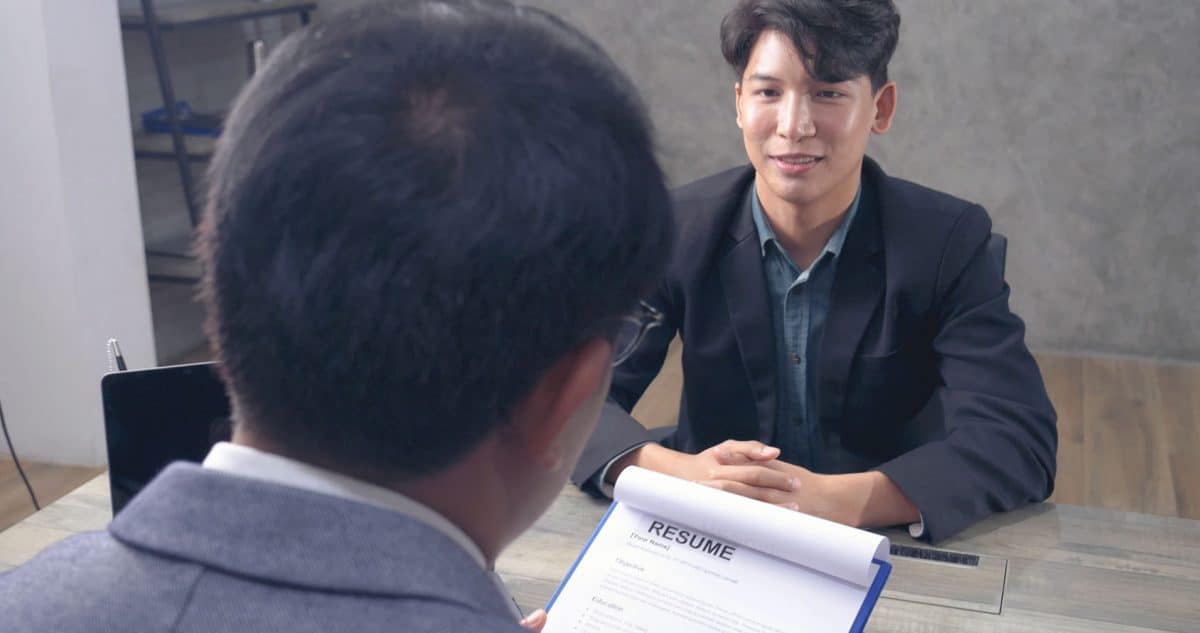Preparing for an interview? Here are some tips from a few industry veterans to help you make a great impression.

Your resume has caught the eye of the recruiter and you’ve made it to the interview round!
But like any field, landing a hardscaping job means nailing the interview.
If you’re preparing for an interview in hardscaping, you want to make sure you’re not just another candidate but someone who stands out as prepared, passionate, and capable. Here are some tips from a few industry veterans to help you make a great impression.
Do Your Research
Before stepping into your interview, take time to research the company. Show that you’ve taken an interest in their work and operations. This doesn’t mean just skimming through their website; dig a little deeper. Follow the company on social media platforms, check out their recent projects, and familiarize yourself with the types of work they do.
“Knowing a little bit about the company is so important because it shows that you take initiative…It’s always a compliment for an employer to hear that someone is following the company online or on social media, but in a subtle way. Saying, ‘Hey, you know I’ve been following you guys and some of the things I love that you do that really draws me to your company is this,’” said Frank Bourque, a Landscape and Hardscape Business Consultant and the founder and host of the Landscape & Hardscape Business Success Summit.
“If someone shows up and they’ve never been on the website, they’ve never looked at what we do, and they don’t really know if we do landscaping or hardscaping or planting flowers, it’s not necessarily a turnoff, but then you’re just like anybody else that shows up at the door.”
Bourque recommends preparing some examples specific to the company you are interviewing with and being prepared to talk about how you relate to that type of work.
Be Ready with Real-World Examples
If you have prior experience, definitely bring it up in the interview. But even if you don’t have direct experience in hardscaping, you can relate your past work or activities to the demands of the industry.
“Even if you’ve never been in the industry, maybe having some examples of where you’ve brushed against the industry. I don’t care if it’s your mother that put in a paver driveway one day, right? But at least that shows me that they understand what we’re doing and what the industry is about,” said Travis Hilldore, Vice President of Sales and Marketing at Pathfinder Systems.
“If you have no experience in hardscaping, make it relatable to something else. Like, ‘Hey, I’ve worked outside. I love that type of work. I know it’s tough. I know long hours outside means having to get ready for your day and to bring lunch,’” Bourque said. “They sound so basic, but these things are so important.”
Bourque said this kind of example shows him that a candidate is motivated and prepared. He also noted that sharing experience working with a team can be helpful.
“If working with a team is part of what you like to do then you’re going to be a great fit for a lot of companies just to start with,” Bourque said. “Because if you’re coachable, you have the right attitude, you seem like you’re organized, you seem like you know what you want to do, those are, I would say, at the top of the list of what employers look for in our industry.”
Showcase Your Soft Skills
The hardscaping industry is not just about skills with tools or equipment; it’s also about teamwork, communication, and reliability. You can prepare concrete examples that highlight your ability to collaborate, problem-solve, and adapt to changing conditions.
“Describe some challenges that you faced in the past, and how you overcame these. It could be having a problem and problem solving with the team and then reaching out to the owner to make sure that it’s a good solution, instead of just presenting a problem to the employer,” Bourque said.
“Employers love to hear how you’ve solved problems because business owners hear problems all day long. They would much prefer hearing, ‘Hey, here’s the issue. But here’s three examples of how we could probably solve this.’”
According to Bourque, employers appreciate candidates who understand the importance of teamwork and reliability.
“For example, when you don’t show up, it impacts the whole team. It might even change the whole day for everybody else around you. So, when you’re able to demonstrate that you have self-awareness, that you know that your behavior is going to impact others, that says a lot. That shows maturity,” Bourque said.
You can also show examples of when you’ve had to adapt to new roles or challenges quickly.
“Be able to show some examples of how over time you’ve been given more responsibility. It shows how you can show up when you’re needed for these things and be consistent at it. I think these are the soft skills that will stand out,” Bourque said.
Hilldore said he likes to ask questions that stretch a candidate’s knowledge and show him how they approach different situations.
“I like to lead with, ‘Hey, there’s no right or wrong answer on this, however, if you ran into a situation where you’re the only one in the office, because we travel quite a bit, and a customer called you up asking very specific questions about a piece of equipment. How would you handle that?’” Hilldore said.
“That just gives me a good feel for their communication style, how quickly they can pick up on the information that’s on our website, things like that. Whether they would lie or not is a big one…You get to see their thought process.”
Come Prepared and Presentable
While many jobs in the hardscaping industry may not require a suit and tie, first impressions still matter. Dress appropriately for the company culture and bring a notebook to the interview.
“To me, something that’s impressive is somebody who shows they’re fairly organized. A notebook with them to take notes, pre-prepared questions,” Hilldore said. “Showing up a little bit early. Looking somebody in the eye while talking to them.”
Pre-preparing questions is a huge plus and demonstrates that you’re serious about the opportunity. Ask about the company’s current projects, what they’re looking for in a team member, or how you can grow within the company.
“If they’re asking about the culture and they’re asking about opportunities for growth. I think that shows some motivation,” Hilldore said.
“I always joke around about that. Everybody talks about their business being a family. Well, frankly speaking, I’d rather be with my actual family on Christmas and Thanksgiving. But we are a close-knit team, and we rely on each other. So, if they’re asking questions about how they can integrate within a group, it shows somebody who is looking to fit in somewhere,” Hilldore said.
After the Interview
The top candidates know the impression they leave doesn’t end when the interview does and they follow up with their interviewer afterward.
A simple email to thank the interviewer for their time and consideration can help keep you top of mind.
“I’d say it’s 50-50 that people even email you and say, ‘Hey, thanks for the interview.’ That used to happen a lot more,” said Trevor Fearn, the VP Operations at CornerStone Wall Solutions Inc. “Now it really makes you stand out.”
Preparing for a hardscaping job interview is all about demonstrating your readiness for the job. If you follow these tips, you’ll shine as a candidate.
Still in the job application stage? Check out our tips on crafting a compelling resume.
